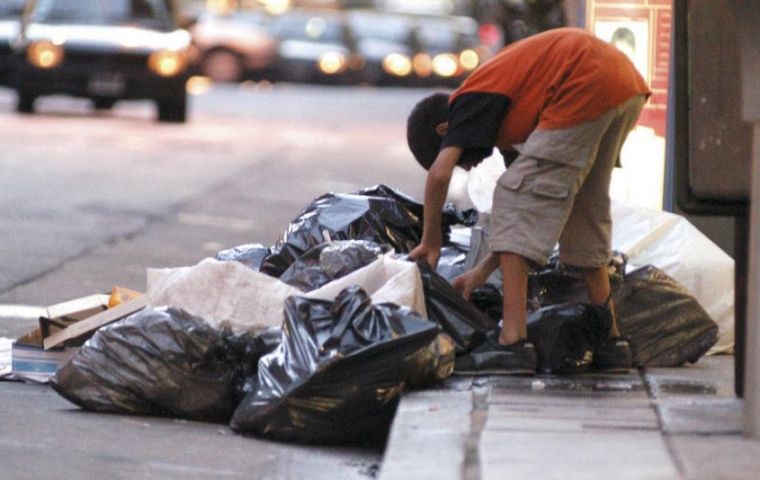MercoPress. South Atlantic News Agency
Argentines striving between childhood poverty and indigence, CFK's favorite economist pointed out
 Superminister Sergio Massa “will do something” about the increasing poverty, Lechter said
Superminister Sergio Massa “will do something” about the increasing poverty, Lechter said Following last week's figures from Argentina's National Institute of Statistics and Census (Indec) pointing out that 50% of the country's children under 15 lived in poverty, researcher Agustín Salvia said the data were “in line with what was expected.”
The director of the Observatory of the Social Debt of the Catholic University of Argentina (Odsauca) also said in an interview published by Montevideo Portal that the scenario ahead was even worse, with general poverty at around 40% and indigence hitting 10% of the population.
Salvia also explained that the difference between what was reported and the current situation stemmed from the average between the first semester of 2022, which had been continuity of the closing of 2021, and the worsening of the current situation, where the worst face of the Argentine economic crisis is being seen. Everything has taken a turn for the worse, “the second quarter of this year,” Salvia pointed out.
Hernán Letcher of the Centro de Economía Política Argentina (CEPA) believes that the slight increase in indigence and the slight drop in poverty is due to the evolution of food prices, which rose by an average of 35%, while services rose by an average of 20%. Hence the difference between poverty and indigence.
“The second reason is that the inflationary level was significant, it affected everything: more indigence and less poverty reduction than expected. This is a sustained behavior since the post-pandemic period. Unemployment did fall abruptly but not poverty: because there has been no recovery of purchasing power in general terms since what was lost during the previous government”, he told Montevideo Portal.
Letcher, reportedly one of Vice President Cristina Fernández de Kirchner's favorite economists, also pointed out that the third reason for the decrease in poverty was social assistance.
“The impact of public works in terms of employment generation has already stagnated and is falling, the reactivation of the informal sector is retracting and inflation is becoming more virulent; and there we already have official data -although not reported, it is in the microdata of the Permanent Household Survey-: 9.4% of indigence and 38.6% of poverty,” Salvia argued while underlining a growing informality among workers. “The trend is clearly worsening” at all levels, he insisted.
Letcher also warned that the oasis of liquidity among consumers due to bonuses paid in May and June will soon wane down. “If there are no bonuses or aid, the current income indicators do not justify thinking about reducing poverty; and, if you do not control the price of food to a large extent, you cannot aspire to reduce indigence,” he underlined.
However, Lechter was confident Superminister Sergio Massa “will do something” about it.




Top Comments
Disclaimer & comment rulesCommenting for this story is now closed.
If you have a Facebook account, become a fan and comment on our Facebook Page!